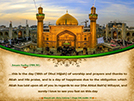1. Importance of ZakÄt
- Details
- Hits: 2208
1. Importance of ZakÄt
“ZakÄt” literally means “purity; justness; integrity and honesty”. In Islamic legal terminology, the word “zakÄt” is used for one of the main obligatory taxes imposed upon the wealth of the Muslims derived from the natural resources given to them by Allah. Its literal meaning implies that by paying zakÄt, one is purifying his wealth by sharing God's blessing with the less fortunate members of the ummah. The wealth of the person who does not pay zakÄt is impure and tainted with the share of the poor and the needy.
One of the ways by which we describe the value of a seemingly simple thing is by comparing it to an item well known for its value. In the Qur'Än, Allah, subhanahu wa ta`ala, also uses this method of emphasizing certain Islamic values: whenever He wants to show the importance of an issue, He combines it with something whose importance is well known to the Muslims. SalÄt, the symbol of Allah's right upon human beings, is a well known virtue in Islam; it is known as “the pillar of the religion”. Similarly, Allah has used zakÄt as the symbol of the rights of human beings upon each other. In order to show the importance of fulfilling the rights of fellow human beings, in many verses, Allah has combined the order of salÄt with the order of paying zakÄt.
All items of zakÄt are related to the natural resources of the earth. They are not the creation of man but blessings of Allah. So by paying zakÄt, we thank Allah by sharing His blessings with other human beings; and we also show our concern for the poor and the needy. Imam ‘Ali bin Abi TÄlib (a.s.) said,
“Almighty AllÄh has made the zakÄt obligatory so that He may test the rich people and provide for the poor. If the people pay zakÄt from their wealth, no one would be poor any longer...”

![take advantage of your [present] time](/en/media/com_hwdmediashare/files/99/f5/fb/5293162f4d04afb1ed8da3034e984340.jpg)









